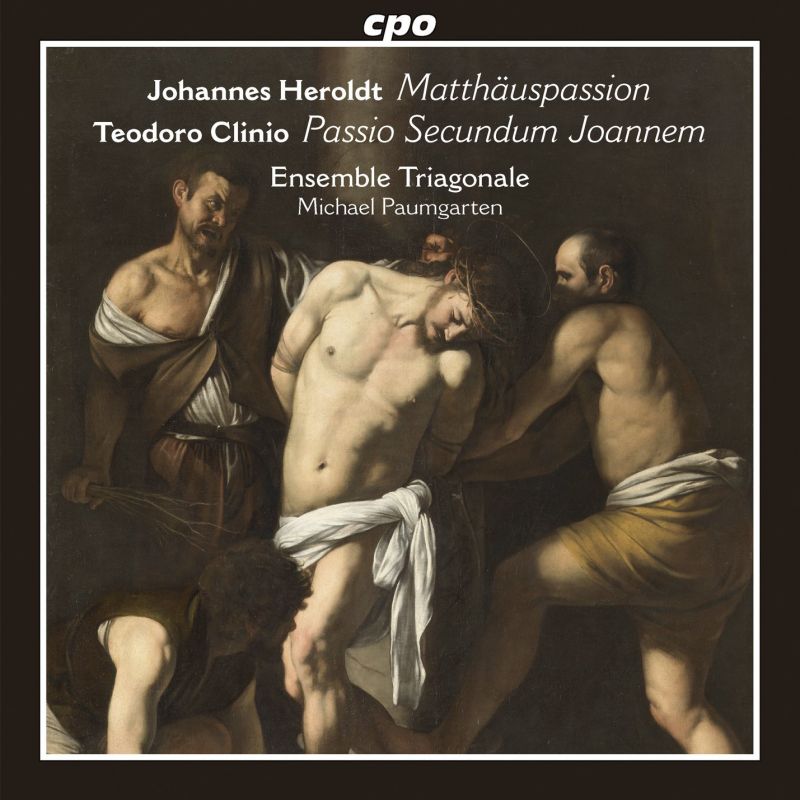CLINIO Passio Secundum Joannem HEROLDT Matthäuspassion
View record and artist detailsRecord and Artist Details
Composer or Director: Teodoro Clinio, Johannes Herold
Genre:
Vocal
Label: CPO
Magazine Review Date: 07/2016
Media Format: CD or Download
Media Runtime: 55
Mastering:
DDD
Catalogue Number: CPO555 025-2

Tracks:
| Composition | Artist Credit |
|---|---|
| Passio Secundum Joannem |
Teodoro Clinio, Composer
Christian Paumgarten, Tenor Ensemble Triagonale Michael Gerzabek, Countertenor Michael Paumgarten, Conductor, Tenor Teodoro Clinio, Composer Terry Wey, Countertenor Theresa Dlouhy-Staber, Soprano Ulfried Staber, Bass |
| Matthäuspassion |
Johannes Herold, Composer
Christian Paumgarten, Tenor Ensemble Triagonale Johannes Herold, Composer Michael Gerzabek, Countertenor Michael Paumgarten, Conductor, Tenor Terry Wey, Countertenor Theresa Dlouhy-Staber, Soprano Ulfried Staber, Bass |
Author: Peter Quantrill
Working in the Lutheran chapels of Carinthia, Johannes Heroldt (or Herold, c1550 1603) produced a motet Passion which begins (as did Bach) in the Upper Room and ends, not a quarter of an hour later, before the Deposition. Interleaved with the recitation are two chorale texts sung homophonically, the first being ‘O Mensch, bewein dein Sünde gross’, set to a tune familiar to anyone who has sung ‘All creatures of our God and King’. The motet sections are mostly homophonic but not without rhythmic variety as they slip in and out of triple metre, with distinct registers of texture assigned to different actors in the drama.
The St John Passion by Teodoro Clinio (d1602) is a less rewarding affair which follows the same model as Lassus, being sung on a recitation tone by a tenor with brief polyphonic interventions to represent the crowd, Christ, Pilate and so on. As a polyphonist, Clinio (an ordained musician working in Treviso and its environs) is not so affective as Lassus, but there remains much to be done in the way of characterising each voice without doing violence to the sure progress of the polyphony. The six voices of Ensemble Triagonale (one soprano, the rest men) are entirely stylish in the matter, discreet in attack and cleanly tuned. The tenor to whom the recitation has been assigned (who may be the ensemble’s director; it isn’t clear) is a little dry – not inappropriately so – but sensitive to the rhythm of the story as the pace slows and the perspective widens towards the climax.
CPO’s presentation is exemplary. There are useful essays giving historical context to each piece, sung texts and translations, session photographs and brief biographies that actually tell us something about the singers rather than offering the usual tedious list of their engagements.
Discover the world's largest classical music catalogue with Presto Music.

Gramophone Digital Club
- Digital Edition
- Digital Archive
- Reviews Database
- Full website access
From £8.75 / month
Subscribe
Gramophone Full Club
- Print Edition
- Digital Edition
- Digital Archive
- Reviews Database
- Full website access
From £11.00 / month
Subscribe
If you are a library, university or other organisation that would be interested in an institutional subscription to Gramophone please click here for further information.




